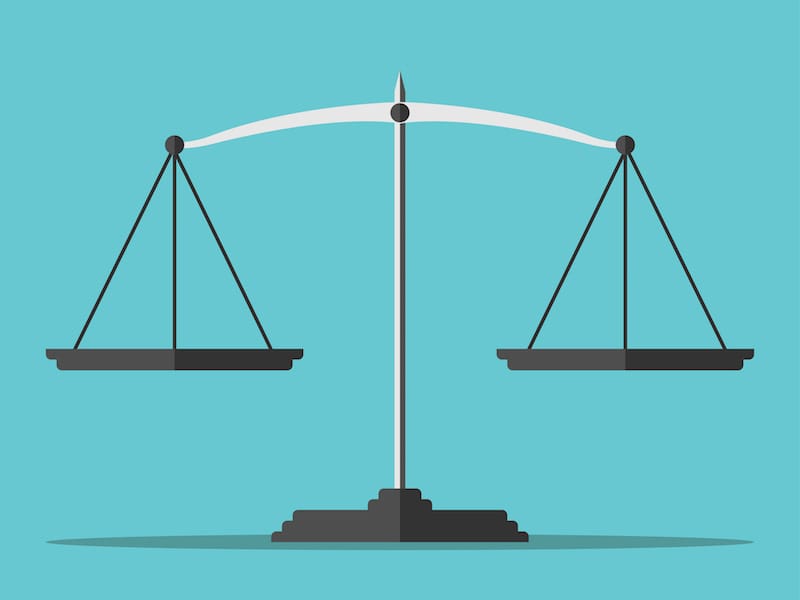Finding a Balance

by Zachary Beyler
When I first sat down to write this article, its focus was on the free exercise and establishment of religion. I had almost finished it, but I felt that it lacked weight and significance even to myself. And, if such was the case for me, the author, then surely it would be so for you, the reader. Instead, I have chosen to open a discussion on a topic which has been the focus of my own thoughts this week, and a regular presence on my mind for a long time. Though here at the Civility Initiative, we focus more on political discussions, this one is more religious in nature. I find that the principles which we try to explore here have particular application on this topic, however. Though the events discussed here are specific to The Church of Jesus Christ of Latter-day Saints, they have general application to all people of faith, and so I invite all to read and participate in the discussion. I wish to explore the dilemma faced by both members of the LGBTQ community and orthdox Christians with respect to active religious life.
Earlier this week, an address by Elder Jeffrey R. Holland of The Church of Jesus Christ of Latter-day Saints to the faculty of Brigham Young University (BYU) in Provo, Utah, caught national attention. For those who are unfamiliar with either the situation specifically or the dynamic of the Church and University, I will briefly explain. The Church of Jesus Christ of Latter-day Saints is a worldwide Christian church with some 16.5 million members. Members of the Church pay tithing (ten percent of their monetary increase) to the Church in order to fund church buildings, temples, etc. One of the major benefits of tithing is private universities, the tuition of which institutions is subsidized by the tithes of church members. This makes the tuition for students of the university extraordinarily affordable, especially in an era of rising education costs. Students sign and live by an “honor code,” committing to live their life by a pre-determined set of standards, including the Church’s “law of chastity,” which prohibits both extra-marital sexual relations and homosexual relationships.
As the consensus in the United States moves towards equality for people of all creeds, races, and orientations, BYU has seen an increase in pro-LGBTQ activity, particularly among its student body. In an address to the BYU faculty on the 23rd of August Elder Holland discussed the future of BYU. I advise everyone to read or listen to the address in its entirety in order to have an unfiltered or predisposed bias entering into this conversation. Elder Holland pointed out that both faculty and students are bound to their commitment to live the honor code and the doctrines and beliefs of the Church:
If we are an extension of The Church of Jesus Christ of Latter-day Saints, taking a significant amount of sacred tithes and other precious human resources, all of which might well be expended in other worthy causes, surely our integrity demands that our lives be absolutely consistent with and characteristic of the restored gospel of Jesus Christ.
He also mentioned that many parents and members of the Church have written to the leaders of the Church (who are also the university’s trustees) and expressed concern with the recent pro-LGBTQ demonstrations on the campus. Elder Holland’s remarks suggested the necessity of maintaining the principles of the Church at the university, and fulfilling its mandate of being a consecrated university committed to educating disciples of the Savior.
However, Elder Holland’s remarks were at best controversial, and at worst harmful to many people who experience same-sex attraction. Quoting both President Dallin H. Oaks and the deceased Neil A. Maxwell (fellow leaders in the Church), Elder Holland referred to those members of the Church early in its history who, under duress of outside persecution, built their temples with a trowel in one hand and a musket in the other. Elder Holland’s intended message is clear: those students and faculty of BYU must build up the university while protecting it from those things which are contrary to the Church’s teachings. To members of the Church, BYU is a university where education and spiritual exaltation meet, and it is to be a place which is separate from the world.
The unintended effect of the “musket analogy” does not take a stretch of the imagination for even the most devout of Elder Holland’s supporters to perceive. My conversations with friends who are members of the LGBTQ lead me to believe that the employment of the musket analogy names them as enemies, sinners, and destructors and disturbers of God’s kingdom on earth. Many members of the Church will undoubtedly take Elder Holland’s message that way as well. The use of the musket analogy by Elder Holland proved to be such a controversial inclusion in his remarks that much of what else he said has been overshadowed and ignored. For example, he discussed the fact that “[. . .] I and many of my Brethren have spent more time and shed more tears on this subject than we could ever adequately convey to you this morning, or any morning. We have spent hours discussing what the doctrine of the Church can and cannot provide the individuals and families struggling over this difficult issue.” He acknowledged the difficulty of the situation and his own sorrow for those who sorrow. But here we stand, yet again, at a point of division and sadness.
The intent of our words in any situation is very often not delivered with tact, or, even when it is, does not alleviate the hurt which the recipient feels. My understanding of Elder Holland’s intent in his address cannot – it does not – diminish the very real fact that people are hurting because of his comments. And more harmful by far, I think, than Elder Holland’s address has been the vitriolic response which has been moving around social media these past few days. These responses include derisive names, calls to arms against LGBTQ community members, and derogatory memes. So much arguing. So little empathy.
Though I cannot possibly comprehend the depth of emotion experienced by members of the LGBTQ community, I am certain that at the very least, they are struggling so much because they feel that their dignity and value have been stripped from them. By being, as I mentioned, labeled as enemies of the Church and of God (even if that was not the intent, that is still how the message is often received), they feel as if they are hated and downtrodden. We cannot invalidate those feelings. When same-sex marriage was legalized, it was done largely on the basis of preserving human dignity.
By statute, they [Obergefell and Arthur] must remain strangers even in death, a state-imposed separation Obergefell deems ‘hurtful for the rest of time” [. . .] This couple [DeBoer and Rose] seek relief from the continuing uncertainty their unmarried status creates in their lives [. . .] their [DeKoe and Kostura] lawful marriage is stripped from them whenever they reside in Tennessee [. . .] Dekoe, who served this Nation to preserve the freedom the Constitution protects, must endure a substantial burden.
Those plaintiffs who appeared before the Supreme Court felt they had been robbed of their dignity. They felt they were lesser beings. They felt ostracized and hurt. We could not invalidate the feelings of the plaintiffs, and we cannot invalidate the feelings of the LGBTQ community now. I cannot invalidate those feelings.
Thus we come to the dilemma that many prthodox Chrsitians face. For just as much as I cannot deny the struggles of the LGBTQ community in orthodox Christian religions, I do not believe that I can decry the Church’s teachings as false. It is not my prerogative to challenge Church doctrine, and I believe that God has given us commandments which cannot be set aside. That is the dilemma that I face.
To all members of the Church, to all Christians and people of all faiths, I ask the following questions. Is it possible to love those who are LGBTQ and support the teachings of the Church? How can we do that, if so? To those who are LGBTQ, I would ask, what can we do to help you in your times of difficulty? And is it possible for us to find a middle ground on this topic? Is it possible for those in the Church to defend its teachings and still befriend members of the LGBTQ community? How can it be done? I can start by empathizing with those people who feel ostracized. I believe empathy, compassion, and charity are the great keys to friendship and love. As I have stated, I do not have the answers. I am willing and eager to listen to suggestions, to complaints, and to learn. I wish for peace among all of us, and for goodwill and love to abound. I have spent many hours over the last few days dwelling on this topic. I wish to have an honest and open discussion on it. I welcome your comments below. I would ask, in the spirit of our Civility Initiative, that we refrain from demeaning words, from logical fallacies, from harsh language. I hope that this is a profitable moment for us.
Despite not having all of the answers, I can at least make this promise: That I as a straight member of the Church, cannot possibly comprehend the pain and sorrow which those members who feel same-sex attraction or gender dysphoria experience. Neither can I put that pain aside, or ignore it, because as a Christian who believes in a loving God, I am bound not just by my religious beliefs but by my own conscience to stand with those who mourn and to comfort them as best as I can. I will talk with them, laugh with them, cry with them if they need it, and love them still the same. In my commitment to love God and keep His commandments, I will likewise remember His second commandment: to love my neighbor as myself. Although I am not in the same position as members of the LGBTQ community who may feel torn between their faith and their identities, I do know that I would want someone to be my friend if I were. I would want someone to be there for me. And so I will do that. I will listen without judgment or disdain. It does not matter to me what people wish to do with their lives; all may do as they please without fear of my condemnation, and with a surety that I will love them still the same.
To all my acquaintances, friends, and especially to those who feel they cannot name me as a friend, I wish to express my love. To think of your pain, even in as inadequate a way as I am capable, makes my heart heavy and my stomach churn. I wish you the best, my thoughts are with you, and I pray that you will find peace. I wish for us all to have more compassion for and empathy with each other, even in our disagreements. May these conversations be the first steps.
